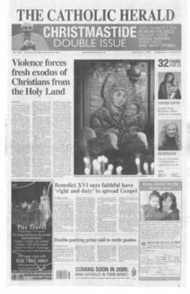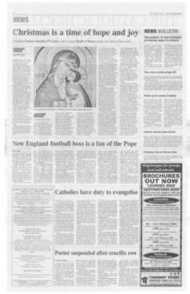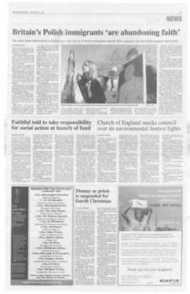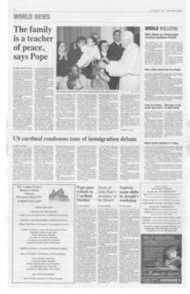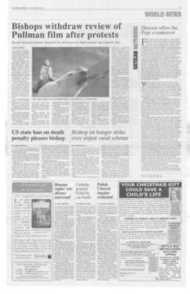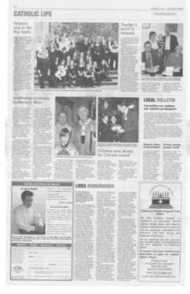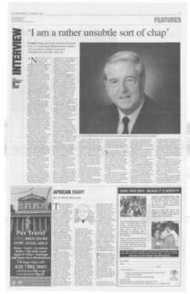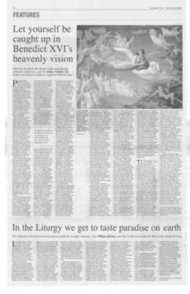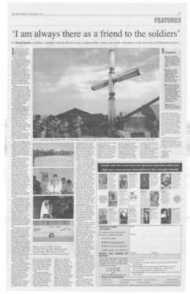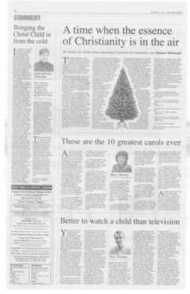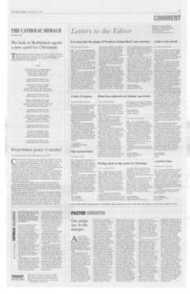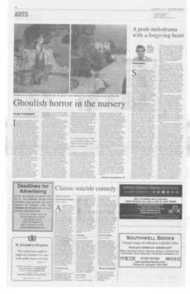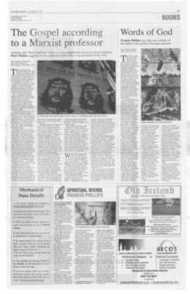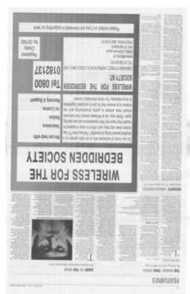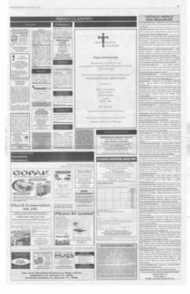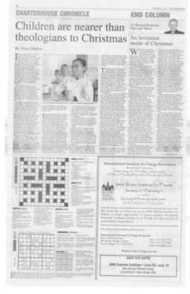Page 7, 21st December 2007
Page 7

Report an error
Noticed an error on this page?If you've noticed an error in this article please click here to report it.
Tags
Share
Related articles
Inquisition Myths Debunked
Horror Over Abortions For Minor Disabilities
Heads Guiding Hearts
Popebenedictxvi From Feared Doctrinal Enforcer To A Pope...
Charming Recollection Of The Catholic Soldier And Knight
'I am a rather unsubtle sort of chap'
Freddy Gray meets the modest historian who revolutionised Reformation studies and founded a highly respected international pro-life network ow, if I may sit on this side," says Professor Jack Scarisbrick, bobbing his head encouragingly as he pushes a chair to one side. That way you get my good ear." He settles by the window and looks up with kind smile.
John Joseph Scarisbrick, eminent Tudor historian and prolife hero. has the uncomplicated decency of a man devoted to what is right. He nods a lot, both as he listens and as he talks. It is a friendly gesture, the habit of an experienced and kind teacher.
The professor's simple charm makes it easy to forget the huge brainpower behind the eyes. He is winningly unpretentious when asked about his Catholicism. "Well, I have never had any crisis of faith," he replies. "I am rather an unsubtle sort of chap." He adds a subtle sort of grin.
Jack Scarisbrick was born in 1928 in London, the last of five children. He attended the John Fisher School, in Purley. Surrey, where his interest in history began: "Typical story," he explains. "I had an inspiring teacher, Fr Freddie Hunt. He had nothing but integrity, enthusiasm and a great gift for storytelling:* Young Jack was especially interested when Fr Hunt spoke about the First World War. Jack's father lost a leg in the conflict and later died from shrapnel wounds. Three of his uncles had also been killed and three more badly wounded. The war hung like a pall over the whole family,he recalls.
After leaving school Jack Scarisbrick served two years in the Royal Air Force. He then went to Christ's College, Cambridge, to read history, sitting at the feet of the distinguished Benedictine scholar Dom David Knowles: "A spellbinder," he remembers.
After finishing his degree the brilliant young man approached Knowles about conducting further research. "He suggested I should do something on John Fisher and having been to St John Fisher School i thought wow."
Today, Scarisbrick still holds a strong admiration for the martyr Fisher. "I am convinced that he is really the prototype of the Counter-Reformation bishop," he says. "Fisher was really the first person to formulate the Catholic response to Protestantism.
"He had the enormous selfconfidence to tell Luther that he was wrong, that he had misinterpreted St Augustine. And what he said carried weight, because actually Fisher was a much better Augustinian scholar than Luther."
Scarisbrick completed his doctorate in 1955. In 1960 he was commissioned to write a biography of King Henry VIII. Eight years later the book was published, to widespread critical acclaim. Almost 40 years on, J J Scarisbrick's Henry VIII is still considered by many to be the standard text on the England's most notorious monarch.
The professor, though, takes little pride in his remarkable achievement. "I think that a lot of the book is wrong now," he says, laughing. "I argued in a convoluted way that Henry VIII had a good case in canon law [to annul his marriage]. He had a case, which was politically much better than the one he tried to use, but don't think it holds water canonically, though politically it does."
For all Scarisbrick's modesty, there is no hiding that he was a founder, if not the founder, of Catholic revisionism, the historical movement that has completely reshaped modem understanding of the Reformation world.
"That's what I am most proud of really, is being part of that. I think, if I might say so," he adds. stammering a little, "it was the first bit of Catholic revisionism that contested the notion that the whole Church had been sinking ever deeper into corruption."
Yet, now that Protestant propaganda has been successfully debunked, it is possible that Catholic historians are Putting their own mythology in its place. Scarisbrick is well aware of this risk. "We are in danger of making the Reformation inexplicable," he says firmly, "I would take the view that there was no sign of total Church corruption. But there were of course serious weaknesses. The Church is always corrupt. always failing, because it is made up of human beings.
"I would want to say to some [Catholic historians]: 'Hang on. Beware of falling for the equal, opposite fault. In rejecting Whiggery and the overwhelmingly Protestant account of English history we must be very careful not to overstate the case."
While the publication of Henry VIII in 1968 represents the pinnacle of Scarisbrick's academic achievement, the passing of the Abortion Act in the previous year had a more significant impact on the course of his life.
In 1970, together with his wife Nuala, he founded Life, which has grown into a sophisticated international pro-life network. The key to their success has been the combination of absolute opposition to all forms of abortion with an understanding approach to women with unwanted pregnancies. "We have become a professional organisation,Scarisbrick says proudly. "though we are, I hope, still a very humane and loving organisation." After four decades of campaigning unsuccessfully to end abortion, Scarisbrick remains optimistic. "I believe that truth will out eventually," he says. "I think there is a deep sense of justice still lurking in the human being. We are creatures who have a response to the transcendent moral law; and a society which professes human rights is living a lie if it denies the fundamental right to life."
Certainly, in recent years, the public's hostility towards the mass destruction of unborn children appears to be growing. Yet hopes of a total victory are marred by conflicts over strategy within the pro-life movement.
One side, led by the Society for the Protection of Unborn Children (SPUC), is opposed to trying to reduce the current legal time limit for abortions, fearing that such a reform would involve greater deregulation of earlier abortions. Life and the Prolife Alliance want to make the best of a bad law.
Scarisbrick refuses to bite his tongue on this issue. "SPUC are being a nuisance," he says, with anger. "I do not know what has got into them. They won't attend any meetings. They have lost all contact with politicians. SPUC claim to be a political pressure group, but they have no political influence. They have alienated the Catholic bishops. Everybody. They are committing hara-kiri.
"I agree that we have to be on our guard. So let's try and negotiate some reform that is worth having, but don't say in advance that it must be all or nothing. That seems to me to be folly."
Today, Jack Scarisbrick's life is Life. He has continued to study and write historical books and essays, specialising in Jesuit missionary history, but his academic career has been subjugated to the pro-life cause.
Do his academic contemporaries tell him that he has wasted his prodigious talents? "They have never said so to my face," he replies. "But I think they would say it behind my back."
Abortion was never discussed at High Table. "It was a taboo subject," he says, with bitterness. "I was constantly disappointed by the cowardice of my colleagues.
"I was tolerated, seen as a nice chap in many respects but with this strange bee in his bonnet. You know, that's his little oddness.
"It is a very strange thing, which I have puzzled over for a long time. How is it that the Leftyliberal ethos has won over the universities? The products of this culture are now in high places: in the judiciary and the media, especially the BBC. It requires heroic courage to stand out against it."
But he spies a chink in the Leftliberal establishment's armour. "Abortiran is part of the national curriculnm. Of course, those who devise the curriculum assumed that it would be taught as part of modern life and as a good thing. But this has given us a wonderful opportunity.
"Most teachers don't want to teach it, so, provided you can offer a sensible, calm and compassionate message, they are pleased to have Life speakers to speak in their set-x*3°1s. Last year our team spoke to, about 50,000 young people," Scarisbrick says, excitedly. "We are creating a new prolife generation." If he is right, legalised abortion may be stopped within 40 years. When tbiat happens, there will be even incsre people who owe their existenc e to Jack Scarisbrick.
blog comments powered by Disqus


